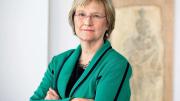In November, the Harvard men’s basketball team laced up their sneakers, took to the court, and played a hard-fought game against Stanford in front of a crowd of more than 7,000 people—and countless others who tuned in for ESPN2’s live broadcast. The teams tipped off not at Lavietes Pavilion in Cambridge or Maples Pavilion in Palo Alto, but at the Mercedes-Benz Arena in Shanghai in a contest co-hosted by a division of the country’s Ministry of Education—the first collegiate or professional regular season contest to be played in China. Harvard senior forward Zena Edosomwan is an East Asian Studies concentrator who welcomed the crowd in Shanghai in accomplished Mandarin.
What inspired a bi-coastal match up thousands of miles from either team’s home court? The opportunity, in the words of Harvard Coach Tommy Amaker, “to promote goodwill…through sport and to provide student-athletes with a transformative cultural exchange experience.” The meeting between Crimson and Cardinal was the heart of a once-in-a-lifetime trip that included an exhibition game against Shanghai Jiao Tong University, visits to museums and temples, and a day at Shanghai Disney with children from the Yao Foundation, an organization founded by former NBA star Yao Ming to improve the lives of Chinese youth.
At Harvard, student-athletes embrace their athletic pursuits in ways that connect the University to people and places around the world. Members of the men’s and women’s basketball teams have spent summers in China educating young people about higher education, in India connecting the values of athletics with success in the classroom, and in South Africa assisting the NBA with its Basketball Without Borders program—an outreach effort that brings the game to thousands of children who may not be exposed to it otherwise. I have spoken in recent years of the University as an inherently global institution that is becoming more intentionally global, and athletics play an important role in this effort.
Deep engagement with the world through sports yields remarkable—and remarkably diverse—outcomes. Love of a Swahili language course, one of more than 80 languages offered by the University, took a recent alumna to Kenya and Tanzania as an undergraduate, and back to Tanzania after graduation to write, direct, and produce an award-winning documentary about women soccer players in Zanzibar. What does it mean to be a woman, a Muslim, and an athlete? She hopes her work will ask those questions and, in her words, “[complicate] our understanding of Africa and of Islam.” Other alumni have taken a different approach and launched non-profit organizations that focus on capacity building. Coaches Across Continents, founded by a Harvard all-Ivy men’s soccer player, uses sport to advance community development and youth empowerment—for more than 2.3 million girls and boys in more than 40 countries since it was founded in 2008.
Other members of the Harvard community spread goodwill through competition on the world stage. In August, ten students and alumni traveled to Rio de Janeiro to compete in the Games of the XXXI Olympiad, representing five countries—Bermuda, Canada, Nigeria, South Africa, and the United States—and demonstrating their prowess in fencing, field hockey, rowing, rugby, and track and field.
Around the globe, athletics—the devotion to practice, to competition in the context of fair play, and to connection through sport—can create a common language. The recent journey of our men’s basketball team exemplifies the University’s expanding global reach—and the universality of sport.









